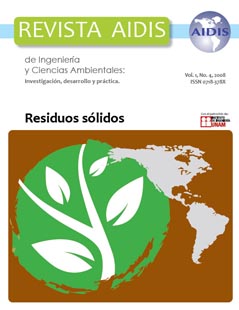Generation of energy from the biogas generated in landfills in Brazil: Potential, legal frameworks, incentives and projects
Main Article Content
Abstract
The generation of domestic solid wastes in Brazil was estimated at approximately 128,000 tons/day in 2000, of which 60% was made up of organic matter. The anaerobic decomposition of this fraction generates biogas, whose energy recovery is entitled to receive “Carbon Credits” through the Clean Development Mechanism (CDM), under the Kyoto Protocol. Estimates of the potential of power generation from sanitary landfill biogas vary from 440 to1480 MW. This article discusses the effectiveness of incentive policies and instruments to generate power from this source through bibliographic and documental research. Research of documents on the Ministry of Science and Technology website verified that out of a total of 161 projects approved by the Brazilian Designated National Agency (DNA), 22 of which are related to sanitary landfills, and only eight of them include energy generation in their scope, but one of them dismisses this possibility due to the low return on the investment. The remaining projects include only the collection of biogas or its improvement through controlled combustion. The research identified some recent laws and public funds that encourage biogas generation from biomass, either in isolated systems or in systems interconnected to the national electric grid. It was noticed, however, that they are not effective for this energy source. An effective instrument is the CDM, but it has been mostly used for methane combustion rather than the energy use because it is not economically attractive due to the additional investment for power generation. The research concludes that there is a need for incentive policies focused on the energy use of USW, financing of research, pilot projects and nationalization of equipment. These policies should determine the obligation of purchasing and establish different prices for this renewable energy, taking into consideration the environmental and social benefits involved.
Article Details
How to Cite
[1]
Cassia Rodrigues, A. and Martins, G. 2009. Generation of energy from the biogas generated in landfills in Brazil: Potential, legal frameworks, incentives and projects. Revista AIDIS de ingeniería y ciencias ambientales: Investigación, desarrollo y práctica. 1, 4 (Nov. 2009).
